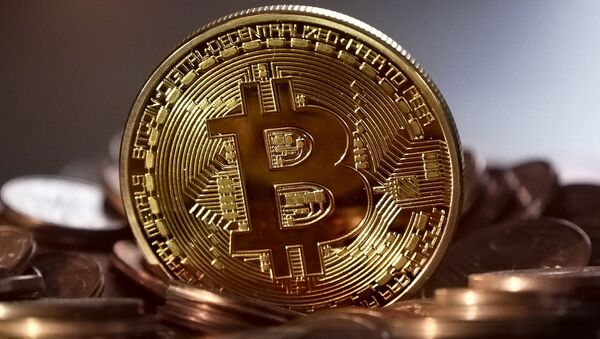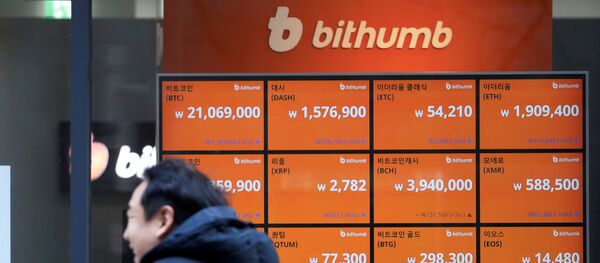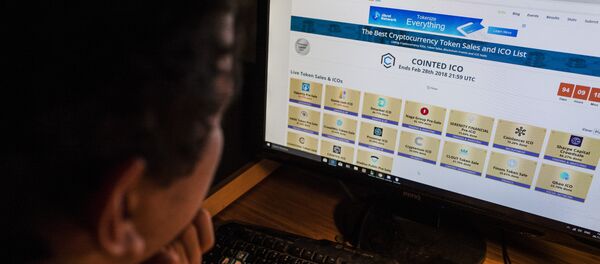Sputnik: The head of the International Monetary Fund (IMF) has expressed some concerns that bitcoin is being used to fund illegal activity. Could regulation of cryptocurrencies like bitcoin lead to a reduction of them being used to fund illegal activities?
Llew Claasen: So I think that the narrative that cryptocurrency use cases are first and foremost driven by illegal activity has been disproven a number of different times already. There’s no evidence to suggest that most of the activity or transactions supports illegal activity. And I think that the idea that cryptocurrencies, particularly decentralized cryptocurrencies like bitcoin, can be regulated is misunderstanding the fundamental nature of decentralized networks. So that’s just a practical consideration. That’s not about should, or shouldn’t you. It’s just that you can’t. So what the regulators are attempting to do is to say well, if there’s no central location where you can apply these regulations, and to be honest with you I think it is sensible, is to say can we regulate the on-ramps and the off-ramps. In this particular case we’re talking predominantly about exchanges.
READ MORE: No Bitcoin, No Cry: Apple Cofounder Got Cold Feet and Sold All His Coins
At the point when you convert from fiat currency to cryptocurrency and vice versa, should we be regulating the flows of money at that point? I think that if regulators say, well we believe that these cryptocurrencies pose risks to us and we should understand those flows, I think it is probably reasonable to expect that we will see more regulators applying those policies. I think that that is responsible. To be honest with you, I think that it’s really just about the points where it influences the existing financial system that are most relevant. So the idea, for example, that I would have a decentralized exchange of value between two parties that doesn’t in any way touch the existing financial system is something that cannot be regulated. I think that regulators are trying to do that, are going to find that it’s going to be essentially a waste of time.
Once again, it’s not because someone is trying to circumvent, it’s just the nature of these technologies. They don’t work that way. And if you’re going to regulate them because you have this strange idea, that unfortunately some financial regulators do have, which is that you are not entitled to privacy in financial transactions then these technologies are going to frustrate regulators. I strongly believe that everyone has a right to privacy in financial transactions, and just because we want privacy, doesn’t mean we want privacy so we can do illegal things. The analogy that has been used many times before is, when you go into the restroom everyone knows what you’re doing in there, that doesn’t mean that you need to keep the door open.
Sputnik: Something that’s been happening with rumors of regulation is that it’s affected the price of bitcoin. In the past month specifically you’ve had South Korea come out and say they’re introducing new regulations, or will do so, and the price of bitcoin has fallen as a result. Some people say that this is a correction, while others say this is the beginning of the bubble bursting. What is your assessment?
Llew Claasen: I don’t think that the threat of regulation is having as much of an impact on the price of cryptocurrencies as many people like to think. I do think that there is a sizeable group of fairly unsophisticated retail investors that had cryptocurrency exposure, or have cryptocurrency exposure, that they acquired in December. I think they tend to panic about these kinds of things. So there is an element of this kind of trading, but by far most of the trading has nothing to do with threat or no threat of regulation. If anything, it’s got more to do with how potential regulations will impact on liquidity. So for example, when China implemented their restrictions on trading on currencies, it was more of a just a function of how are you going to get money in and out that you had on those exchanges, rather than the regulations themselves.
I think that the prices of cryptocurrencies, in general, are reflecting irrational exuberance. I don’t think that the prices of any of these cryptocurrencies or tokens reflect utility. So there must be a correction back to utility, I genuinely believe that. I don’t necessarily believe that it must be a bubble in the sense that a bubble implies that something inflates and then it no longer exists. We’re not talking about something analogous, say to the tulip mania. That has been overused so many times. I mean, what is fundamentally different say between the dot com bubble and say the tulip bubble, is that the tulips were infected with a virus that affected their coloration and then they eventually died. So people were trying to trade in an asset that had zero fundamental value at the point when the tulip no longer existed. The dot com bubble was different in the sense that infrastructure was created while there was this irrational exuberance for what the internet was going to do but could not do at that point in time.
READ MORE: Soros Calls Cryptocurrencies 'Typical Bubble' Based on Misunderstanding
So that was a timing issue, in the sense that asset prices went up where they were no longer reflecting revenue or profitability of the start-ups and there was a correction. And that didn’t mean that we stopped using the internet, it just meant that for the next year or two it was more difficult for you to raise money for a startup business and people started to focus much more on fundamentals. That is fine, that is good. There is nothing wrong with that. I think that we’re going to find that it’s a similar kind of thing with cryptocurrencies, where these projects and the token prices must eventually be measured against their impact and the results that they are delivering and that’s good. So are we in a bubble? No, as defined as something that must eventually pop. Must we have a correction downward? Yes absolutely. Has that correction already happened? I think there is still some space to go, but it has certainly started.
Sputnik: So one of the things you mentioned is that a correction has to happen because there needs to be a re-evaluation of bitcoin. I was wondering what you think of the Weiss ratings that were released on bitcoin; how justified do you think they are?
Llew Claasen: So, let me just be clear, I think the correction is not bitcoin in isolation. I think that cryptocurrencies in general, because of the fact that they are correlated with each other, we’ll see a correction.
With regards to the Weiss ratings, I don’t think it matters at this stage whether they are right or wrong. I think that the principle that we should be applying more analytical rigour to better understand the value of cryptocurrency coins and tokens and their ability to execute on their vision, and the impact that they could have in the longer term is great, and if anybody is doing that, that’s fantastic. Do I care about relative ratings between
Llew Claasen: No I don’t think so. I think that anybody is entitled to have their opinion, and if that opinion is backed up by data, fantastic.
Sputnik: Moving in a slightly different direction, Venezuela has announced its own virtual currency, ‘petro’, and it’s being created in order to evade US financial sanctions. Do you think cryptocurrencies, in general, could undermine the strength of US hard power, like sanctions?
Llew Claasen: If we look at the Venezuelan example specifically, I think that that project is doomed to fail. I think that the government’s inability to create an economy characterized by price stability and sound financial management is not going to change, just because you’re issuing a currency on a blockchain. These things necessarily need trust in them, and there is no trust in the Venezuelan government’s ability to enact fiscally responsible policies or monetary policies, and so I think that we can kind of park that as something which is arguably seeking attention rather than genuinely solving a problem.
Do I think that cryptocurrencies are a threat to government’s ability to enact monetary policies? I think that the best way to understand that is to read some of Hayek’s work around having private currencies. And of course around the time he wrote that stuff he didn’t know that cryptocurrencies would exist one day, but the principle is kind of this: if governments act in the base interest of their populations and they create price stability, they will see that their ability to enact monetary policy will not be affected, I don’t think, in any way. However in cases where governments do not create those kinds of conditions, where they create asset bubbles through things like quantitative easing, where they create hyperinflationary economies, these cryptocurrencies do absolutely pose those kinds of risks.
But in the short-term, let’s be realistic about the kind of reach that they have and the difficulty that the average person has in both acquiring and holding and spending these cryptocurrencies, in the short-term it will have zero impact. In the long term, I think it acts as a counterbalance rather than something which frustrates your ability to enact sound policies.
Sputnik: Speaking more generally, could cryptocurrencies be used as a tool by governments in order to bolster their economies?
Llew Claasen: I think that my experience so far with governments talking about cryptocurrencies, is that it is viewed more as an instrument of control than it is of one that creates greater levels of financial inclusion and financial participation. So I am opposed to the idea of governments issuing their currency on blockchain, and I don’t think that it leads to greater levels of economic participation for as long as we have a fractional reserve financial system. I think that the two are separate issues.
Sputnik: Finally, I wanted to ask you about something you’ve been campaigning against for a while now, which is legislation 1241 that the US government is considering passing. Do you think that this legislation will affect cryptocurrency regulation internationally?
Llew Claasen: So I think that the first thing is, is that that piece of legislation is first and foremost about anti-money laundering in general. Section 3 of that piece of legislation specifically deals with cryptocurrency, but there’s a lot of other parts of that piece of legislation which have nothing to do with cryptocurrency. So it’s almost as if section 3 was drafted without fully understanding the consequences of including cryptocurrencies in the ambit of that legislation. So if we just talk about section 3 and its application to cryptocurrencies, then I think that the challenge is that it is not properly drafted. It is in conflict with the work being done by other agencies and other pieces of legislation. And so, the main issue is that it seeks to avoid classifying cryptocurrency as money as defined, and instead it sort of unintentionally creates a problem where anybody, particularly in small businesses that are trying to make use of this very innovative technology are suddenly facing a regulatory burden which they cannot possibly deal with.
READ MORE: Japan's Financial Watchdog to Punish Coincheck After Massive Hack
And so you have a situation where if the legislation is passed as it is intended, with section 3 drafted the way it is, you will force financial innovation using blockchain technology out of the US. I don’t think that given our representation if I give you an idea of how that engagement has changed since the end of last year when we were first talking to Senate staffers versus now, I think that there is a realization of what those consequences will be. Certainly, we weren’t the only ones that made representations. So I think that the current administration doesn’t want to discourage innovation. I think that the bill was drafted in a way which they now understand will have the impact of doing that and I would like to believe that it will not pass in its current form. Do I think that we need controls to prevent cryptocurrencies from being used for illegal purposes like money-laundering, terrorist financing and tax evasion? I completely understand that and I support that view, but I think that this particular piece of legislation will not achieve that objective and actually create a regulatory burden for small businesses.
Sputnik: If it passes in its current form, do you think that other countries would see it as an example of how to regulate cryptocurrencies?
Llew Claasen: No. No because it’s drafted in a way which is very specific to other pieces of legislation that exist in the US, and so it wouldn’t be passed in that form in any other jurisdiction.
The views expressed in this article are solely those of Llew Claasen and do not necessarily reflect the official position of Sputnik.





